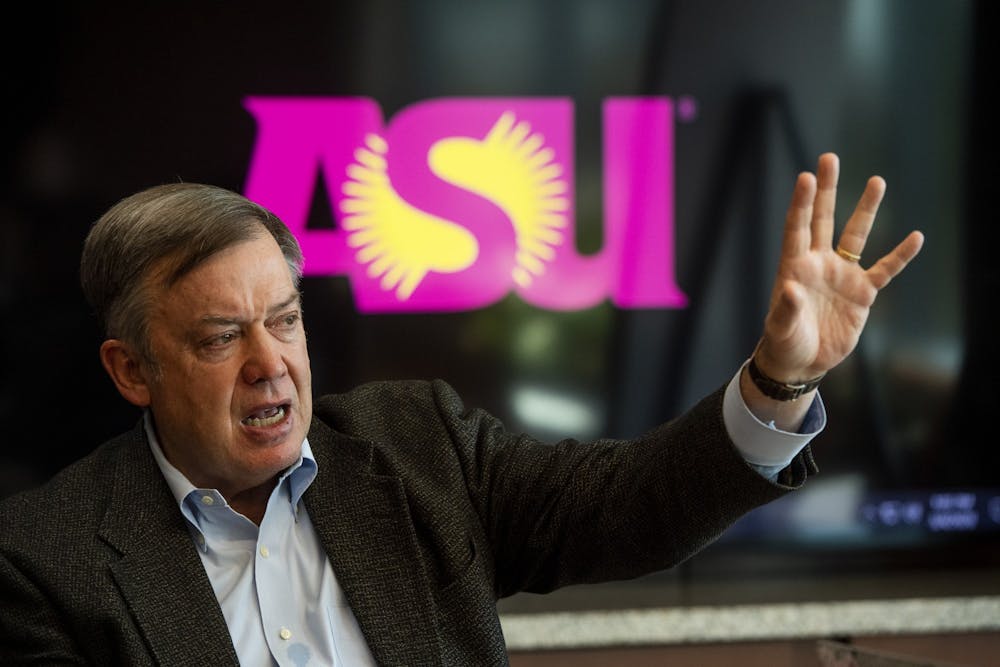The University is ready to move to Zoom and online courses if the COVID-19 situation worsens in Arizona, ASU President Michael Crow said in a radio interview Friday.
"In any event, we're ready to reassemble," and "Zoom only," Crow said. "Whatever comes, we're going to be ready."
Crow joined NAU President Rita Cheng and UA President Robert Robbins in a call with Arizona Technology Council and Phoenix Business RadioX to discuss the state of higher education in Arizona.
All three universities have announced plans to have classes on-campus during the fall semester, while following health guidelines to prevent outbreaks, but the universities will be flexible with their planning to prepare for a scenario where those plans must change.
READ MORE: Crow provides more details on fall semester in ABOR meeting
Crow said that managing the pandemic will be key in what the coming months look like.
"The three common sense things that people aren't doing enough of: wearing your mask, staying socially distant and hyper cleaning your hands in particular," Crow said. "If you do those three things you have some chance of knocking this thing down just from those three things alone."
Arizona has made national headlines over the past week due to the surge of COVID-19 cases in the state. According to data from the Arizona Department of Health Services, the state now has 66,458 cases and a total of 1,535 deaths. Recent data from ASU's Biodesign Institute Critical COVID-19 Trends page showed that tests Thursday had a positive testing rate of 23% over a seven-day trailing period.
READ MORE: Biodesign COVID-19 data trends show a continued rise in Arizona cases
In a press conference Thursday, Gov. Doug Ducey said the state was heading in the wrong direction and urged Arizonans to stay home and stop the spread, but offered no executive orders to prevent people from going out.
ADHS data show that the state is currently at 88% capacity in intensive care unit beds.
"I don't want there to be any illusion or sugar-coated expectations: We expect that our numbers will be worse next week and the week following," Ducey said.
Crow was critical of scientific "ignorance" some people have displayed over the past few months. But he added that the silver-lining of the pandemic is that it will hopefully shake the anti-science mentality many in the country have.
"This is a big moment for the reduction in the ignorance index of our population," Crow said. "Our population now hopefully will be less ignorant about the importance of science and the basing of decisions on scientific understanding, rather than on the fantasy that viruses don't actually move around between people, rather than on just the complete total fantasies that people live under."
Thursday, Robbins said that if UA had to reopen now, they wouldn't, The Arizona Republic reported.
"If we brought back students ... and it caused our hospitals to be overrun, that's the point where we can't go and we're teetering on that," Robbins said on the radio program Friday.
Other topics and Crow's last comment: Wear a mask, be more accessible and continue to be innovative
Crow said the universities will be spending the next few weeks monitoring the spread of the virus and the effectiveness of preventative measures.
If people want everything to go well over the coming weeks, everyone needs to wear a mask to help reduce the spread of the coronavirus, Crow said.
ASU has already announced all people on-campus must wear a mask indoors and when social distancing is not achievable.
"ASU is a tight-knit community with a shared sense of purpose and our success is tied to one another," Crow said in a statement on face coverings. "Accordingly, our mindset is to take whatever precautions related to COVID-19 we must to help protect not only ourselves, but those around us."
Crow, Robbins and Cheng agreed that the switch to Zoom courses in the spring due to the lockdown showed that the universities could deliver education through different platforms, like Zoom.
"The pandemic has taught us the different teaching and learning models available to us and our students," Cheng said. "I think we're just at the formative stages of ways we can think about in terms of enhanced access (to education)."
Crow addressed the recent racial issues in the country by saying universities have helped contribute to the inequalities in the U.S. because universities are not publicly accessible for all citizens.
"We made it so expensive that almost no one can afford to attend across the country," Crow said. "You know, and so we've done a poor job at making our educational processes publicly accessible and we need to do a better job at that and we need technology to help us to be able to do that."
All three presidents spoke on what the universities are doing to bring a more innovative economy to Arizona, similar to Silicon Valley.
Crow said the state needs to start seeing itself as a bigger player and recognize that Arizona is capable of becoming a leader in innovation in the U.S.
Reach the reporter at wmyskow@asu.edu and follow @wmyskow on Twitter.
Like The State Press on Facebook and follow @statepress on Twitter.

Wyatt Myskow is the project manager at The State Press, where he oversees enterprise stories for the publication. He also works at The Arizona Republic, where he covers the cities of Peoria and Surprise.




